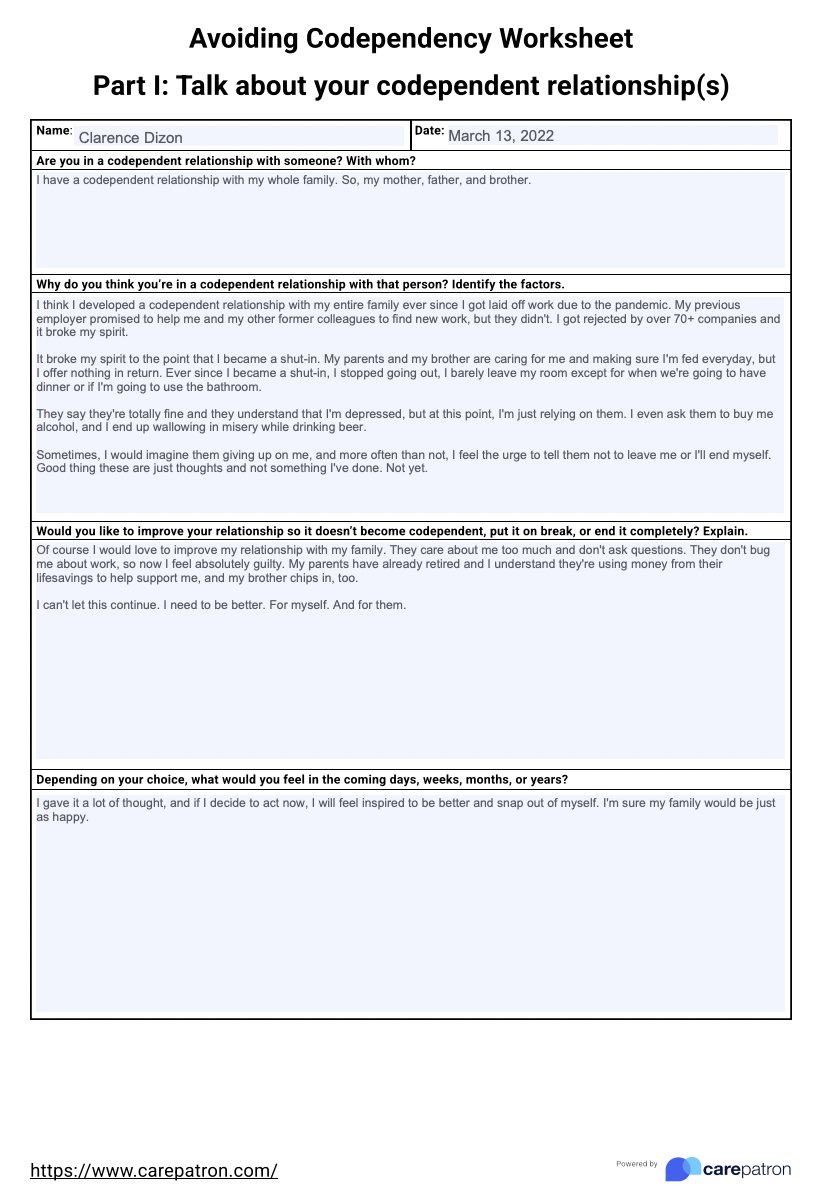5 Essential Worksheets for Codependency Recovery

Codependency recovery can be an enlightening journey, filled with self-discovery and growth. For many, breaking free from codependent patterns isn't just about changing behaviors but understanding oneself better. Incorporating worksheets into this process can be incredibly beneficial. Here's a detailed look at five essential worksheets that can aid in codependency recovery, helping individuals to establish healthier boundaries, improve self-esteem, and foster independence:
1. Personal Boundaries Worksheet

The first step to overcoming codependency often involves defining and asserting one's personal boundaries. Here’s how you can use a worksheet for this purpose:
- List Your Boundaries: Start by listing various aspects of life where boundaries are important (e.g., personal space, time, emotions, etc.).
- Assess Current Boundaries: Evaluate how these boundaries are being respected or violated in your current relationships.
- Set New Boundaries: Determine what you would like these boundaries to be moving forward.
- Plan Communication: Reflect on how you can communicate these boundaries effectively to others.
Table: Example of Boundaries Table:
| Area | Current Boundary | Desired Boundary | Communication Plan |
|---|---|---|---|
| Personal Space | Family members enter my room without knocking. | I need my space to be respected; knock before entering. | Inform family about my need for privacy and set a rule for knocking. |
| Emotional Boundaries | I often feel responsible for others' happiness. | I am not responsible for others' emotions. | Express that I care but won't take on others' emotional burdens. |

📝 Note: Boundaries are personal and dynamic; they might need revisiting as you grow in your recovery journey.
2. Self-Esteem and Validation Worksheet

Individuals with codependency often seek validation from external sources. This worksheet can help redirect the source of validation inward:
- List Personal Strengths: Identify and list out your positive traits and achievements.
- Identify Negative Self-Talk: Record any negative thoughts that come to mind when you're in doubt.
- Reframe Thoughts: Practice reframing these negative thoughts into more positive or neutral statements.
- Daily Affirmation: Write and read an affirmation about your worth each day.
3. Independence and Decision-Making Worksheet

Building independence is crucial in codependency recovery. Use this worksheet to foster autonomy:
- Decisions Analysis: Reflect on decisions made in the past week, evaluating how they were influenced by others or based on your own judgment.
- Decision-Making Process: Describe your process for making decisions now and how you might like to change it.
- Practice Making Small Decisions: Start with small decisions to practice independence in everyday life.
- Track Progress: Record feelings and outcomes of decisions made independently.
4. Emotional Inventory Worksheet

Understanding and managing emotions is key to breaking codependent patterns:
- Identify Emotions: Keep track of your emotions throughout the day.
- Emotion Triggers: Reflect on what triggers these emotions.
- Response Strategies: Develop healthy responses to these emotions.
- Emotional Balance: Work on maintaining emotional balance and self-care routines.
5. Relationship Reflection Worksheet

This worksheet focuses on reflecting on current and past relationships:
- Relationship Mapping: List out key relationships in your life.
- Role Analysis: Analyze the roles you play in these relationships.
- Identify Codependency Patterns: Look for signs of codependency and consider how you can change these patterns.
- Healthy Relationship Goals: Set goals for healthier interactions.
The journey of recovering from codependency involves consistent self-awareness, reflection, and adjustment. These worksheets provide a structured way to tackle different facets of codependency, from setting boundaries to fostering independence. While worksheets are tools, remember they are not a panacea. Therapy, support groups, and literature on codependency complement these tools, providing a holistic approach to recovery.
What if I struggle with setting boundaries?

+
Setting boundaries can be challenging, especially if you’re used to accommodating others. Start small, communicate clearly, and expect to adjust over time. Therapy or support groups can provide guidance and practice in this area.
How often should I use these worksheets?

+
Regular use is key. Consider dedicating a specific time each week or even daily for reflection and completing these worksheets. Consistency will help you track progress and make tangible changes.
Can I use these worksheets if I’m not in therapy?

+
Yes, the worksheets are designed to be self-directed tools for personal growth. However, they can be more effective when combined with professional guidance or peer support in understanding codependency better.
What if I feel like I’m not making progress?

+
Progress can be slow in codependency recovery. It’s important to recognize small victories, seek support, and understand that this is a non-linear process. Adjust your approach as needed, but keep moving forward.
Do these worksheets replace therapy?

+
These worksheets serve as tools for personal exploration and growth. They can enhance the therapeutic process but are not a substitute for professional therapy, which provides deeper insight and tailored strategies.